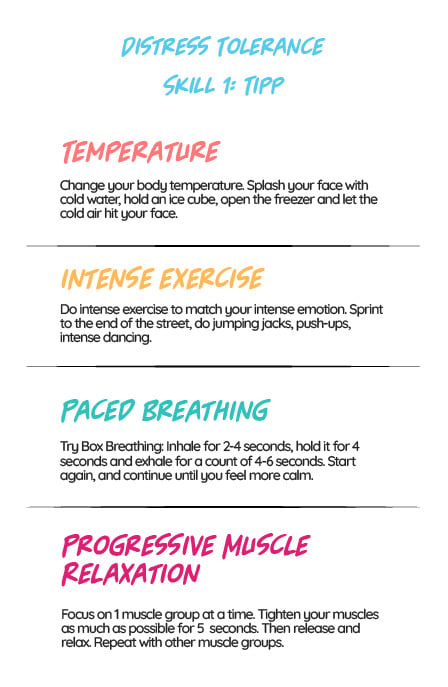Excerpt
Goals: Go Slowly
Remember that change is difficult to achieve and fraught with fears. Be cautious about suggesting that “great” progress has been made or giving “You can do it” reassurances. Progress evokes fears of abandonment.
Lower your expectations. Set realistic goals that are attainable. Solve big problems in small steps. Work on one thing at a time. “Big”, long-term goals lead to discouragement and failure.
Family Environment
Keep things cool and calm. Appreciation is normal. Tone it down. Disagreement is normal. Tone it down, too.
Maintain family routines as much as possible. Stay in touch with family and friends. There’s more to life than problems, so don’t give up the good times.
Find time to talk. Chats about light or neutral matters are helpful. Schedule times for this if you need to.
Managing Crisis, Pay Attention, But Stay Calm
Don’t get defensive in the face of accusations and criticisms. However unfair, say little and don’t fight. Allow yourself to be hurt. Admit to whatever is true in the criticisms.
Self-destructive acts or threats require attention. Don’t ignore. Don’t panic. It’s good to know. Do not keep secrets about this. Talk about it openly with your family member and make sure professionals know.
Listen. People need to have their negative feelings heard. Don’t say, “It isn’t so.” Don’t try to make the feelings go away. Using words to express fear, loneliness, inadequacy, anger, or needs is good. It’s better to use words than to act out on feelings.
Addressing Problems, Collaborate and be Consistent
When solving a family member’s problems, ALWAYS: Involve the family member in identifying what needs to be done; Ask whether the person can “do” what’s needed in the solution; Ask whether they want you to help them “do” what’s needed
Family members need to act in concert with one another. Parental inconsistencies fuel severe family conflicts. Develop strategies that everyone can stick to.
If you have concerns about medications or therapist interventions, make sure that both your family member and his or her therapist/doctor/treatment team know. If you have financial responsibility, you have the right to address your concerns to the therapist or doctor.
Limit Setting, be Direct but Careful
Set limits by stating the limits of your tolerance. Let your expectations be known in clear, simple language. Everyone needs to know what is expected of them.
Do not protect family members from the natural consequences of their actions. Allow them to learn about reality. Bumping into a few walls is usually necessary.
Do not tolerate abusive treatment such as tantrums, threats, hitting and spitting. Walk away and return to discuss the issue later.
Be cautious about using threats and ultimatums. They are a last resort. Do not use threats and ultimatums as a means of convincing others to change. Give them only when you can and will carry through. Let others – including professionals – help you decide when to give them.






